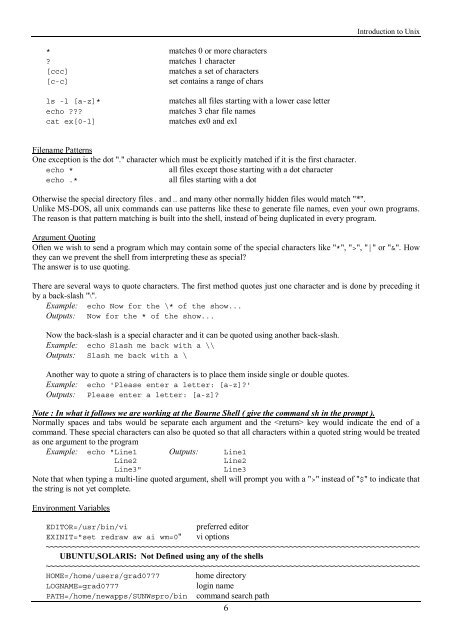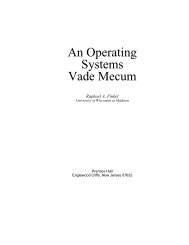Create successful ePaper yourself
Turn your PDF publications into a flip-book with our unique Google optimized e-Paper software.
Introduction to <strong>Unix</strong><br />
* matches 0 or more characters<br />
? matches 1 character<br />
[ccc]<br />
matches a set of characters<br />
[c-c]<br />
set contains a range of chars<br />
ls -l [a-z]*<br />
echo ???<br />
cat ex[0-l]<br />
matches all files starting <strong>with</strong> a lower case letter<br />
matches 3 char file names<br />
matches ex0 and exl<br />
Filename Patterns<br />
One exception is <strong>the</strong> dot "." character which must be explicitly matched if it is <strong>the</strong> first character.<br />
echo *<br />
all files except those starting <strong>with</strong> a dot character<br />
echo .*<br />
all files starting <strong>with</strong> a dot<br />
O<strong>the</strong>rwise <strong>the</strong> special directory files . and .. and many o<strong>the</strong>r normally hidden files would match "*".<br />
Unlike MS-D<strong>OS</strong>, all unix commands can use patterns like <strong>the</strong>se to generate file names, even your own programs.<br />
The reason is that pattern matching is built into <strong>the</strong> shell, instead of being duplicated in every program.<br />
Argument Quoting<br />
Often we wish to send a program which may contain some of <strong>the</strong> special characters like "*", ">", "|" or "&". How<br />
<strong>the</strong>y can we prevent <strong>the</strong> shell from interpreting <strong>the</strong>se as special?<br />
The answer is to use quoting.<br />
There are several ways to quote characters. The first method quotes just one character and is done by preceding it<br />
by a back-slash "\".<br />
Example: echo Now for <strong>the</strong> \* of <strong>the</strong> show...<br />
Outputs: Now for <strong>the</strong> * of <strong>the</strong> show...<br />
Now <strong>the</strong> back-slash is a special character and it can be quoted using ano<strong>the</strong>r back-slash.<br />
Example: echo Slash me back <strong>with</strong> a \\<br />
Outputs: Slash me back <strong>with</strong> a \<br />
Ano<strong>the</strong>r way to quote a string of characters is to place <strong>the</strong>m inside single or double quotes.<br />
Example: echo 'Please enter a letter: [a-z]?'<br />
Outputs: Please enter a letter: [a-z]?<br />
Note : In what it follows we are working at <strong>the</strong> Bourne Shell ( give <strong>the</strong> command sh in <strong>the</strong> prompt ).<br />
Normally spaces and tabs would be separate each argument and <strong>the</strong> key would indicate <strong>the</strong> end of a<br />
command. These special characters can also be quoted so that all characters <strong>with</strong>in a quoted string would be treated<br />
as one argument to <strong>the</strong> program<br />
Example: echo "Line1 Outputs: Line1<br />
Line2<br />
Line2<br />
Line3"<br />
Line3<br />
Note that when typing a multi-line quoted argument, shell will prompt you <strong>with</strong> a ">" instead of "$" to indicate that<br />
<strong>the</strong> string is not yet complete.<br />
Environment Variables<br />
EDITOR=/usr/bin/vi<br />
preferred editor<br />
EXINIT="set redraw aw ai wm=0" vi options<br />
~~~~~~~~~~~~~~~~~~~~~~~~~~~~~~~~~~~~~~~~~~~~~~~~~~~~~~~~~~~~~~~~~~~~~~~~~~~~~~~~~~~~~~<br />
UBUNTU,SOLARIS: Not Defined using any of <strong>the</strong> shells<br />
~~~~~~~~~~~~~~~~~~~~~~~~~~~~~~~~~~~~~~~~~~~~~~~~~~~~~~~~~~~~~~~~~~~~~~~~~~~~~~~~~~~~~~<br />
HOME=/home/users/grad0777 home directory<br />
LOGNAME=grad0777<br />
login name<br />
PATH=/home/newapps/SUNWspro/bin command search path<br />
6
















